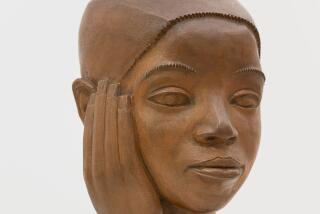A Biographer’s Biography : DR. JOHNSON AND MR. SAVAGE, <i> By Richard Holmes (Pantheon: $23; 272 pp.)</i>
- Share via
We can see them walking together around St. James’s Square in London, exalted by their shared tastes in literature, high-spirited, exchanging anecdotes and allusions with all the brio of those learned in the world as well as books. And yet the friendship between Samuel Johnson and Richard Savage has seemed, to the doctor’s more learned biographers, to be a rare moment of weakness when he left Parnassus in order to lie in the gutter. Boswell described Savage’s character as one marked by “profligacy, insolence, and ingratitude,” although he himself should have recalled that such people are often the best company in the world. The facts would seem to be on his side, of course; Savage was about to be hanged for murder when he was granted a royal pardon, and he ended his life in a debtor’s prison. What could he possibly have to do with the Great Cham, the compiler of the Dictionary, the editor of the Rambler and author of “The Vanity of Human Wishes”?
This is the conundrum that Richard Holmes attempts to solve in “Dr. Johnson and Mr. Savage;” he describes it as “the biography of a biography,” since he is concerned with removing the accretions of literary mythology and pious memorializing that are supposed to have covered these two early 18th Century writers. So let us go back to the nights in St. James’s Square, where Johnson and Savage patrolled the streets together among what Holmes depicts as “the tavern signs, the shuttered house-fronts; the moonlight and the dark alleys; the slumbering beggars, the footpads and the Night Watch.” Johnson is in his late 20s (Savage is approximately 10 years older), a strange, large, shambling man, prone to nervous spasms, ugly, half-blind, marked by scrofula. He is also subject to moods of melancholy, depression and despair. He had achieved very little as a failed schoolmaster in his native Lichfield; he was the unhappy husband of a woman 20 years his senior, and he could see very little ahead of him except the monotonous grind of hack work for London publishers.
Holmes describes the relationship between Johnson and Savage as one resembling pupil and teacher, but it is likely that Savage could educate Johnson in nothing but the darker secrets of the London world. Another explanation for their strange friendship might be found in the mere fact of companionship--Savage had found a lonely provincial literator who would listen to his stories without feeling the need to correct them, while Johnson had found a high-spirited and exciting friend who could literally, to use an anachronistic phrase, “take him out of himself.” Savage had confronted, and mocked, the world--just as Johnson, with all his physical and nervous disabilities, longed to do. The two men found an ideal relationship, providing comfort and inspiration in equal measure.
It is Holmes’ contention, then, that Johnson was hardly “a sage from boyhood” but an awkward and impressionable young man. That in itself is hardly surprising, but the strength of Holmes’ book resides in his determined efforts to recapture the living figures who tend to prove so elusive in literary biography. He is very good, in particular, with Johnson’s thwarted sexuality; it seems likely that the younger man was deeply affected by Savage’s own ready and open acceptance of sexual experience and, although he does not go so far as to state emphatically that they visited brothels together, the implication is clear enough. But there was more to their relationship than the pursuit of erotic adventure. Holmes has a marvelous chapter entitled “Night,” for example, in which he suggests that the two men were twin subversives, political radicals who despised the claims of wealth and the prerogatives of power.
Here we must concentrate upon the career of Savage himself, at least as it appears in Johnson’s own “Life of Mr. Richard Savage”: “He lodged as much by Accident as he dined and passed the Night, sometimes in mean Houses . . . sometimes in Cellars among the Riot and Filth of the meanest and most profligate of the Rabble.” His story, according to Johnson, is as wretched as any in the history of English literature-- Savage was the abandoned child of Lady Macclesfield, who disowned him at birth, tried to have him shipped off to the American plantations, but then consigned him to a London cobbler where he might live “in Poverty and Obscurity.” But this was only the beginning of Savage’s misfortunes; when he was condemned to death for committing a murder in a brothel, his mother urged the Queen to carry out the sentence without thought of pardon. It is no wonder that Richard Savage, the poet and playwright, should spend much of his literary skill in railing against wealth and privilege.
That, at least, is what Holmes describes as “the romantic drama” that Johnson helped both to maintain and to popularize. It is not necessarily accurate, however, and “Dr. Johnson and Mr. Savage” is on one level an instructive corrective to the prevalence of literary legends. It seems probable that Lady Macclesfield was in fact a loving and attentive mother to her acknowledged children, who was herself victimized by Richard Savage in a campaign of “terrorizing and persecution;” Savage himself may have in fact only suffered delusions that he was an abandoned child, and his real character was “dangerous, unstable, ambitious, irascible.” It then becomes one of Holmes’ contentions that Johnson’s insecurity and thwarted ambition led him to identify with Savage, and thus collude in the romantic fictionalization of his plight.
In fact, Holmes throws a quite different light upon the neglect and poverty with which he is associated in Johnson’s plangent biography. Savage was not obscure at all; he was the object of general London attention and was often the recipient of gifts from various patrons. Certainly he had enough money to keep rooms at Westminster while simultaneously renting what Holmes calls “spacious lodgings” in Richmond, outside London, so that he might be close to Alexander Pope as well as to a rising generation of nature poets, of whom James Thomson was the most illustrious member. What was the source of these funds? The truth seems to be that, through intermediaries, Savage had managed to extract blackmail money from Lady Macclesfield by promising to suppress a malicious and scandalous preface on her conduct. This is the man of whom Johnson wrote, “For his Life, or for his Writings, none who could candidly consider his Fortune, will think an Apology either necessary or difficult.”
Then of course there is the little matter of the murder of which he was found guilty and for which he only narrowly escaped hanging; it was the result of an affray in a whorehouse, according to Holmes rather than Johnson, where Savage behaved in a threatening and ultimately violent manner. After his pardon by the Queen, he found yet more of the notoriety for which he always sought, and in the process he managed to extort even more blackmail money from Lady Macclesfield’s relatives. Nothing could save him from himself, however, and he died within the walls of a debtor’s prison in Bristol.
So what has happened to this dissipated and disreputable blackmailer? He has vanished into the mists of time, to be replaced by the memorable and almost mythical figure who is at the center of one of the greatest literary biographies ever written in English. Yet Samuel Johnson’s “Life of Mr. Richard Savage,” imaginative memorial as it is, is now perfectly complemented by Holme’s own volume, which acts as a Baedeker through the reeking purlieus of 18th Century Grub Street, while at the same time bringing fully to life two of the most complex and fascinating characters of English letters.
More to Read
Sign up for our Book Club newsletter
Get the latest news, events and more from the Los Angeles Times Book Club, and help us get L.A. reading and talking.
You may occasionally receive promotional content from the Los Angeles Times.








